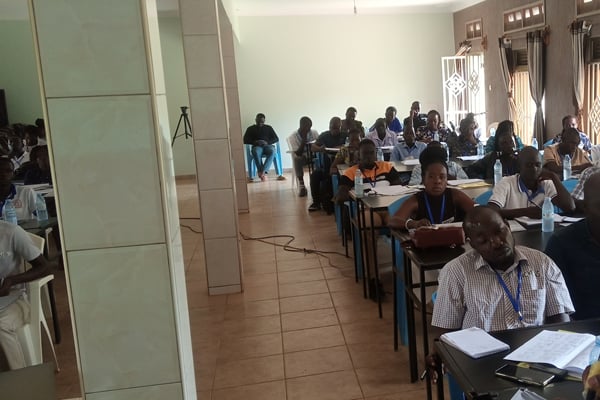Over 1,000 Ugandan adolescents assessed in life skills

Assessors attend a capacity buliding training at Rainbow Hotel in Oyam Town, on May 1, 2024. PHOTO | BILL OKETCH
What you need to know:
- The participants are persons aged 13 to 17 both in and out of school. They are selected from 75 enumeration areas in Oyam, Jinja and Kasese districts
A new education assessment is being conducted with 1,050 Ugandan adolescents to determine if they have the necessary skills and tools to navigate the challenges of the world.
The participants are persons aged 13 to 17 both in and out of school. They are selected from 75 enumeration areas in Oyam, Jinja and Kasese districts.
The respondents are being assessed in four key areas; problem solving, collaboration, self-awareness, and the value of respect. The actual assessment kicks off Friday, May 3, 2024, through Sunday, May 5, according to an official.
The contextualised assessment tool being piloted in the three districts was developed by the Regional Education Learning Initiative (RELI) network under its Action for Life Skills and Values in East Africa (ALiVE) Initiative.
Ms Kandy Alum, the coordinator for ALiVE in Oyam District, said data generated from this pilot programme will help in the improvement of the assessment tools, and generate evidence on how life skills can be assessed.
“What we are doing currently is testing the tool. Data that will be generated from this assessment will help us to improve the tool, and it will also help us to generate evidence on how life skills can be assessed,” she added.
Uganda is currently implementing a new Lower Secondary Curriculum which is competency-based and aims at equipping learners with the skills and values they need to face challenges with positivity and creativity.
Evidence shows that not only are these competencies needed in the workplace, but they are crucial to support academic achievements and promote the holistic development of the individual and of society.
To facilitate this transformative process in the region, RELI launched the Assessment of Skills of Life Skills and Values in East Africa project in 2020. The major objective of this intervention is to develop a standard framework to measure skills, raise public awareness, and strengthen local capacities to assess and nurture life skills and values.
Mr Benson Ongom, Oyam District inspector of schools, thanked the development partners for the initiative.
“Uganda’s education system is not very good as I look at it. The skills and then the core values that should be embedded in us are not there. We speak about them but in practice, we don’t see it happening with us,” he said at the training of the assessors at Rainbow Hotel, Oyam Town, on Wednesday.
Mr Emmy Zoomlamai Okello, the Country lead of RELI Africa, noted that assessing life skills and values has been a big challenge in the country due to the lack of a tested comprehensive tool.
Mr Christopher Muganga, the curriculum specialist at the National Curriculum Development Centre (NCDC), agreed that generic skills or soft skills are a critical area of a learner’s education right from the beginning “because it is going to format this learner into a person with a unique personality.”
“For instance, if a person handling a store of ammunition has questionable character, he can even be selling these ammunitions to bad people. People who have access to nuclear plants must have high moral authority because what they are handling is very dangerous,” he said.
Ms Faridah Nassereka, a lead investigator said: “We were having a tool that was developed for the global north to put them in use within the region and yet we needed tools that are developed by us and for us that really depict a true picture of an East African in relation to life skills and values.”




